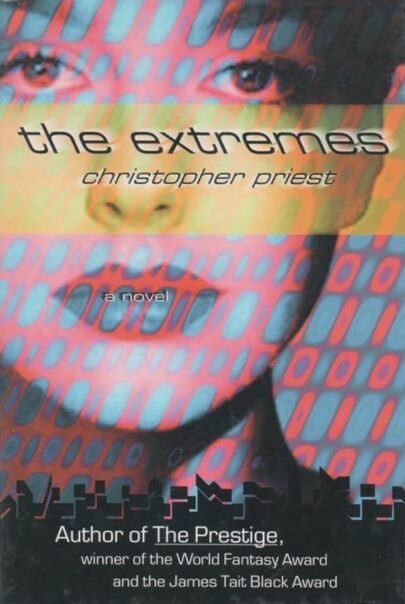 By CHRISTOPHER PRIEST (St. Martin’s Press; 1998)
By CHRISTOPHER PRIEST (St. Martin’s Press; 1998)
There’s an interesting novel lurking in THE EXTREMES, but it never quite makes its way to the surface. The late Christopher Priest (1943-2024) was following up THE PRESTIGE (1995), his most iconic novel, and appears to have been trying for something similar in THE EXTREMES—but whereas THE PRESTIGE was sprawling and streamlined (far more so than the Christopher Nolan film adaptation), this one merely feels sprawling, not to mention meandering and uneven.
The subject was a popular one in the late nineties: the exploitation of violence by the media, which here takes the form of virtual reality programs put out by a company known as ExEx, or Extreme Experience. These programs offer meticulous recreations of violent events that offer users a chance to experience them directly, as either killer or victim.
Teresa Simons, a British born DOJ Special Agent, is widowed after Andy, her similarly employed husband, is killed in a random shooting spree that occurs in the Texas community Kingwood. Eight months later, on temporary leave from her job, Teresa visits a hotel in Bulverton, England, where a similar shooting spree occurred on the same day as the other. Teresa meets the traumatized Amy, who works in the hotel and was present during the massacre, and Amy’s lover Nick, who owns the hotel and likewise witnessed the killings.
We follow Teresa from Bulverton to Kingwood and back, driven by a fanatical need to learn the circumstances of Andy’s death. There’s little in the way of urgency, with Priest dwelling on incidental details (this is a novel that could have stood to lose around a third of its 393-page length) that make for a protracted and unexciting read.
The novel’s most satisfying portions are its hallucinatory passages, i.e. those that occur in virtual reality. Being inside this realm, which has a bewildering set of physical properties (VR was still a largely theoretical concept in the late nieties), causes the “reality” to subtly alter, leading to multiple VR-set passages that are repeated with subtle alterations.
The final hundred pages see Priest assume full Philip K. Dick mode as Teresa enters an ExEx rendering of the Bulverton massacre (coming out of which isn’t too easy) in a gripping and confounding but ultimately unsatisfying wrap-up. The sense of dreamlike frisson governing the ExEx universe is well maintained, but the novel’s major theme, of media irresponsibility, is dropped completely, as are at least two major supporting characters and their corresponding subplots.
